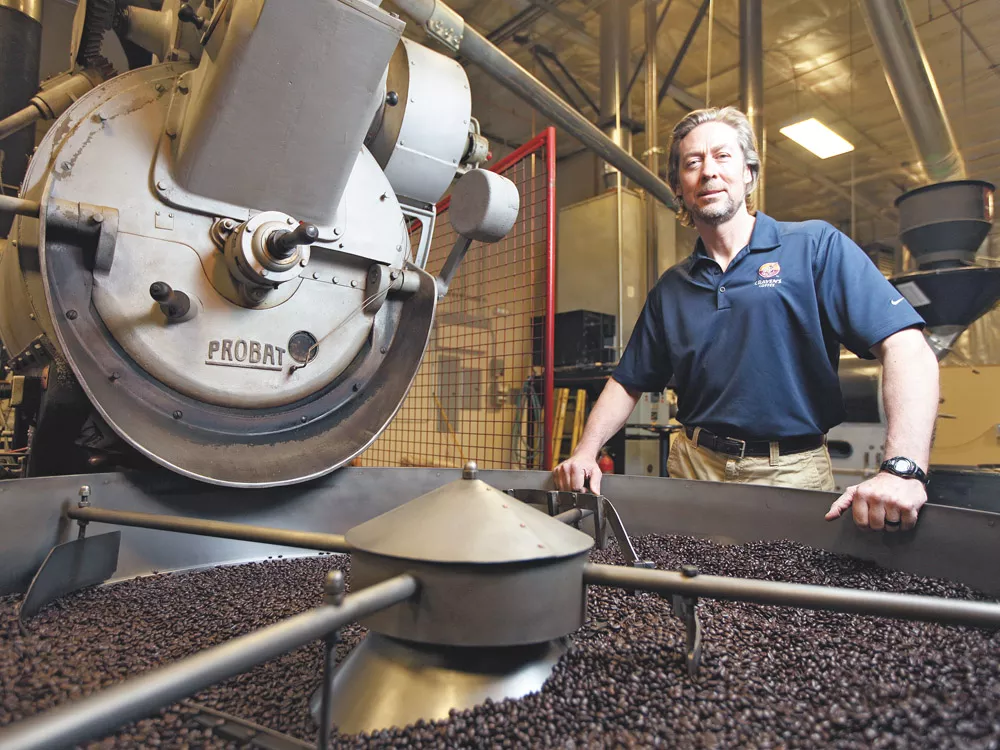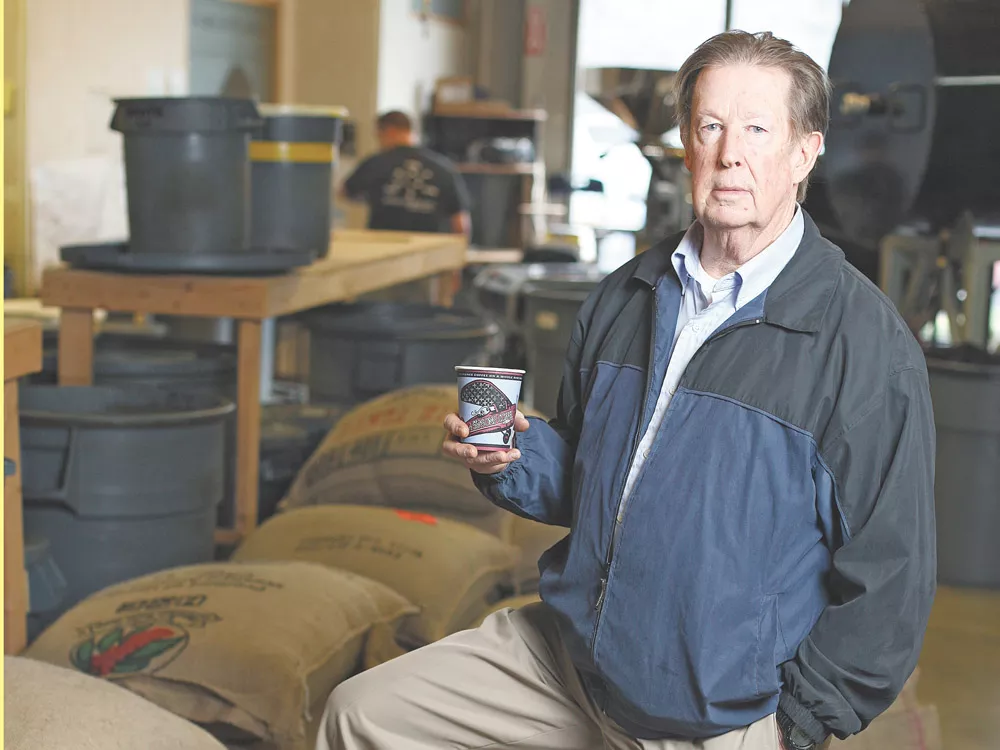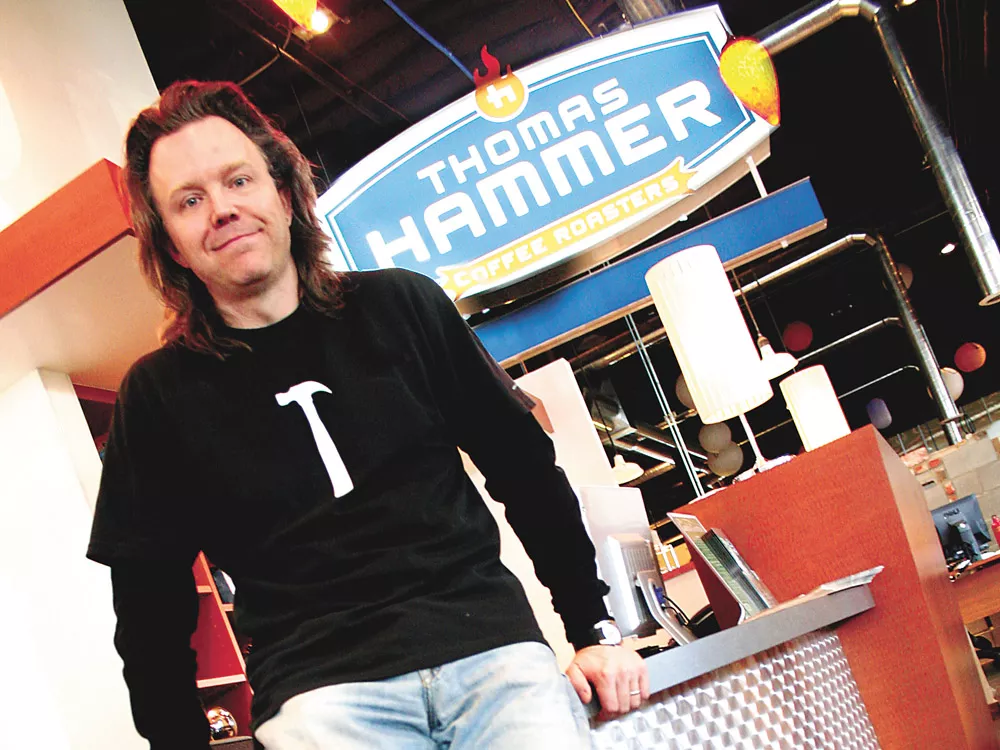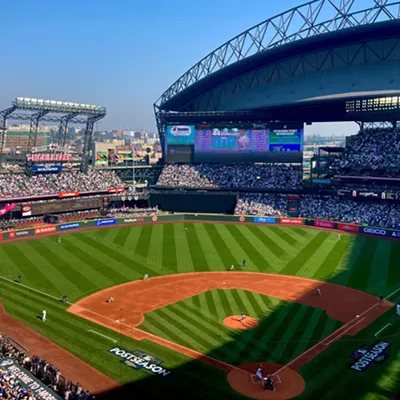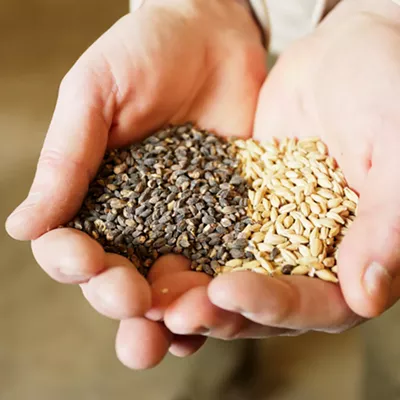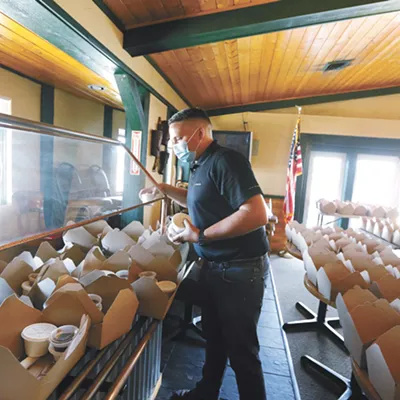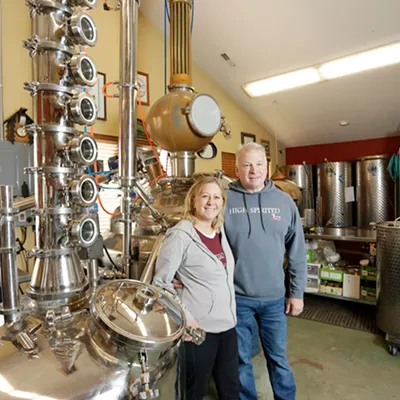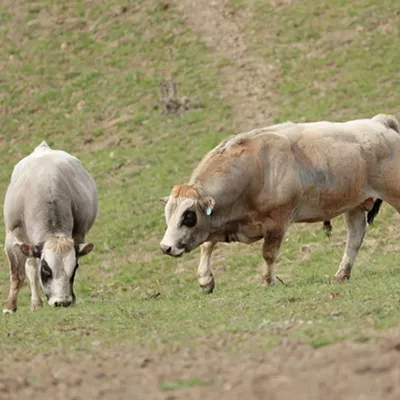It was April Fool’s Day of 1993 — a hell of a day to open a new business, thought Simon Thompson and his wife, Becky Templin.
Especially in this neighborhood. The two Seattlites had decided to open a cafe and coffee roaster in downtown Spokane, across the street from a shady bar on the corner of First Avenue and Cedar Street, in what was then a “horrible part of town,” Thompson recalls.
The space was awkward. The Eldridge Building, built in 1925, had been home to the Northwest’s most successful Buick dealership and was once “the largest building in the state of Washington devoted to the sales and service of motor cars,” according to the city’s Historic Preservation Office.
But working around the large car ramp leading into the building — and without a cash register — the couple soon turned the 800-square-foot space into one of the city’s first specialty cafes.
Nearly 20 years later, the cafe is gone, but the business remains. With a yearly output of half a million pounds of roasted coffee, Craven’s Coffee has become a staple in the region.
For Thompson, the 70-hour work weeks roasting coffee in the small shop seem like a lifetime ago.
“It just seems like a blur,” says Thompson, his British accent still perceptible. “But I think it was just that we were in the absolute right place, at the right time.”
Coffee was going through a revolution at the moment.
First, there had been Folgers and Hills Brothers. Then Starbucks and others came along and began treating coffee less like a commodity — like wheat — and more like a treasured foodstuff — like wine. And then came the specialty coffee roasters, representing what has come to be called the Third Wave, which aspires to produce the best artisanal coffee.
The Inland Northwest certainly has been swept up in that wave, with the number of roasters growing from three in the early 1990s (Four Seasons, Craven’s and Uccello’s) to nearly 30 today.
Locally, it’s become a high-stakes game, as specialty roasters compete not only against each other but also against the big players, like Starbucks and Tully’s, and the grocery megastores, like Costco.
“The pie has been baked,” Thompson says. “Now it’s a question of everybody trying to get a piece of the same-sized pie, whereas all through the ’90s and the first part of the 2000s, the pie just kept getting bigger.”
Small roasters strive to set themselves apart, looking for their niche, and have some things working to their advan tage.
Because of their scale, they can invest in organic and fair-trade certifications, use specialty equipment, focus on the quality of the beans and develop relationships with farmers.
“The best way to market yourself is to define who you are and let everyone know what you’re all about,” says Thompson.
As a whole, the global industry stretches from farmers in Africa, South America and Asia to importers and wholesale buyers and, finally, to roasters. In 2010, the U.N.’s International Coffee Organization reported that the United States alone imported 21,340,853 bags of unroasted coffee beans, each weighing 60 kilograms. That’s almost 3 billion pounds. At several dollars a pound, there’s a lot of money tied up in coffee.
In the Inland Northwest, though, it started much smaller.
Changing Seasons
In 1976, Tom and Leslie Hutchinson plopped Spokane’s first coffee roaster in a small cafe space in downtown Spokane, on Wall Street. They dubbed themselves the 4 Seasons Coffee Company and began roasting. But not just coffee beans.
“I remember we had a gentleman who came up from the Palouse, and he wanted to know if we would roast triticale, which is a cross between wheat and rye,” Leslie Hutchinson recalls.
She says his plan was to make a coffee substitute, much like the ones common during World War I. It was that type of side operation, which they ran on the graveyard shift, that helped sustain 4 Seasons as Spokane’s first and longest-running coffee roasting operation.
The Hutchinsons hail from Berkeley, Calif., and the Bay Area, a region considered among the “it” places for coffee in the States. But Tom Hutchinson wanted to move somewhere with four separate seasons, so they made Spokane, a previous vacation spot, their new home.
Introducing the area to specialty-roasted coffee was a challenge, Leslie Hutchinson says, especially given how expensive coffee was at the time.
“We knew it was going to take time,” she recalls.
“Because even though Starbucks was maybe a couple years ahead of us … I think specialty coffee was resonating here a little bit, but there certainly wasn’t that much on the shelves, let’s put it that way.”
But it did catch on, and soon the Hutchinsons hired more staff. One of them was a ponytailed Gonzaga student named Thomas Hammer.
‘ Hip and Cool ’
The coffee boom of the ’90s meant Four Seasons soon had company on the local specialty-roasting scene. When 1993 arrived, so did two new competitors: Craven’s and Thomas Hammer. For them, settling down in Spokane to roast was not a random or romantic decision. Both knew the market and both came prepared for domination.
Thomas Hammer left 4 Seasons after his two-year contract had ended with the roastery. Armed with an MBA from Gonzaga, Hammer bought a mobile coffee cart at the NorthTown Mall and began the process of launching his empire, along with the help of a former roaster of 4 Seasons.
Three decades later, Hammer boasts more than 250 accounts, 11 retail stores and a large, trendy roastery in a downtown Spokane warehouse. He made a name for himself, and that name became his marketing strategy.
“From the retail end of it … we look at ourselves, proudly, as being like a junior Starbucks. I’m not afraid to say that,” Hammer says. “We just look at their model and say, ‘How do you do that, but make it cool? How can you make it hip and cool?’” Hammer stands out among his peers because of his emphasis on branding — his logo is on his cups, T-shirts and the Thomas Hammer cafes (their newest store is in downtown Pullman).
Craven’s Simon Thompson, meanwhile, has worked to build up a reputation as a worldly roaster — traveling, meeting with farmers and experiencing different coffee regions. Even in the initial cafe space downtown, the walls were decorated with pictures of Thompson at the farms where their coffee originated.
“A lot of what we do is about travel,” says Thompson. “That’s really very unique to us. We’re really the only roaster that goes to source countries consistently, every year.”
Organic and Fair-Trade
On the outside, DOMA Coffee Roasting Company’s headquarters are as inconspicuous as any warehouse complex in Post Falls, Idaho — just one cell in a series of barely-distinguishable units. But as soon as the door opens, the rich smell of coffee begins to fill your nostrils and, soon, the fibers of your clothing. Five minutes inside and you’ll be perfumed with its product for hours.
DOMA is owned by husband-wife team Rebecca and Terry Patano, who, after owning a successful specialty cafe in Utah, decided to try their hand at roasting. Now in its 12th year, the roasting company has made a name for itself by introducing and embracing Third Wave principles — the coffee is all organic and fairly traded, their roasting equipment is eco-friendly, and they follow sustainable business practices.
But what really distinguishes DOMA is how they buy their beans. DOMA is a member of Cooperative Coffees, a buying co-op that allows a group to act as their own coffee broker. It’s a simple idea — cutting out the middle man — but the logistics of the coffee industry make putting this into reality difficult.
“In order to bring coffee to the United States, you have to fill a shipping container. Now, a shipping container is 250-300 bags of coffee. Each one of those bags has 150 pounds,” says Jim Hottenroth, a former chemist who roasts and is in charge of buying beans for DOMA. “And 300 bags of coffee is not one little guy, tilling his plants out there. It’s a lot of coffee.”
Aside from the math, there are also ethical concerns, especially when it comes to the struggles facing the world’s coffee farmers.
“Every farmer we’ve met everywhere … it’s the same story,” says Terry Patano. “Governments come in and do awful stuff. … The stories truly are tragic.”
Producing fair-trade coffee hasn’t necessarily answered all of the economic concerns facing farmers.
“The U.S. may want it, they may think it’s a good thing to buy fair-trade coffee, organic coffee, but we’re finding it harder and harder to get our hands on it,” Hammer says. “The farmers have just stopped, because they can fertilize their crops and get 20 percent more yield, because the price is so high. They can make just as much money and they don’t need to monkey around with all these covenants to qualify.”
Roasters, too, struggle with the regulations of organic and fair-trade certifications.
“We’re monitored here like you wouldn’t believe,” Leslie Hutchinson says. “They need to be able to track every sale, every pound, and know that that legitimately was a fair-trade organic coffee.”
Hutchinson says that certifications must be kept up on a quarterly basis, which means two thick binders full of paperwork. It also means strict regulations on how the roastery must operate.
“Because we roast non-organics as well, a section of the warehouse has to be designated for the organics. You cannot have the [organic] burlap bags touching the other [non-organic] ones,” says Hutchinson. “It’s just not an easy process at this point.”
Hutchinson says they pay between $2,500 and $3,000 in fees each year and worries that all the hoops that roasters — like farmers — have to jump through may be the death of organics.
“I think they are finally recognizing, that if [governing organizations] don’t make it easier for the roasters, there’s going to maybe be a little bit of a back-off from doing it,” says Hutchinson.
A Crowded Field
Deborah Di Bernardo has an edge to her. It’s not aggressive per se, but tough.
It could be connected to her upbringing in a 1,200-square-foot house crammed with her “loud and chaotic and loving” New York Italian family. It could also be the challenges she has faced since
then. In what sounds like the beginnings of a rom-com plot, Di Bernardo married, then divorced a divorce lawyer. She lost everything, she says, including her north Spokane business, the Broadway Deli, which she ran from 1990-94.
But she picked herself up again and got into marketing and sales, eventually working for Thomas Hammer for a stretch.
Immediately after leaving Hammer, Di Bernardo got to work on her own coffee company.
Six months later, she was joined by Hammer’s former roast master and green bean buyer, Dave Rier. Together, they launched Roast House two years ago.
So far, Roast House is faring well. The roaster now supplies several local cafes — Huckleberry’s and Main Market, among others. Part of Di Bernardo’s success, she says, comes from her marketing the roastery as part of the Third Wave.
“We knew how much competition was in town,” says Di Bernardo. “[But] nobody in Spokane was doing 100 percent sustainable coffees, meaning all the coffees are fairly traded, or directly traded so the farmers are earning more than fair trade.” (DOMA, which embraces Third Wave principles, is in Post Falls.)
Still, it’s not easy. The competition is intense, by all accounts.
“When I see these people open up, I’m thinking, ‘Where are you going to get your business from?’” says Thompson. “What happened in Spokane from the early ’90s to the 2000s was a one-off. It was the birth of an industry.”
Some agree with Thompson, saying that Third Wave roasters face challenges with the current economy and with convincing consumers to give a damn.
Still, for those committed to the movement’s ideals, it’s not really a matter of choice.
“It’s about sustainability,” says Terry Patano of DOMA.
“That’s a throw-away word. But here, it’s practical.”
One-Man Show
Brian Ellsworth used to make $200,000 to $350,000 a year as a stockbroker. His expansive home on the South Hill can attest to that. But after a health scare, Ellsworth needed a change. So, after 20 years, Ellsworth decided to quit the stock market in favor of roasting coffee.
Ellsworth started Waverly’s Coffee, Inc., in 2005. He bought a roaster from Sandpoint and jumped into the game, building a massive garage on his property to serve as his roastery. But what began as a romantic leap has become a struggle.
Since losing the employee in charge of roasting, Waverly’s has become a one-man operation. Ellsworth does everything himself — roasting, packaging, delivering and billing. The only outside assistance he gets comes from a bookkeeper.
“Right now, to compete with Craven’s and bigger firms, I have to offer coffee systems, I have to service them, I have to do all this crap that’s not coffee,” says Ellsworth.
Then there’s the problem of collecting on bills. “I’ve had a hard time getting paid,” says Ellsworth, who just received $20,000 owed to him from an espresso stand. “I had to fire them and threaten lawsuits. … You become the bad guy when you have to play collector.”
In Ellsworth’s massive roasting garage, bags of green beans lay in haphazard piles. He apologizes for the mess. It’s just that he is doing everything himself, he says.
There is an air of fatigue in place of his normally extroverted, chatty demeanor as Ellsworth discusses his struggles in the market. Some are obscure issues, like how a client recently backed out of an account after Ellsworth made a joke about Starbucks, calling it “Charbucks.” It comes up several times in conversation.“I’d always made that comment because everybody laughs at ‘Charbucks’ and ‘Starburnt,’” he says. “Somebody had told that to me and I had thought that it was funny as hell.”
There’s also the constant threat of accounts being taken over by other roasters, who may have the means to seduce clients out of his grasp — promises of better equipment, training, service, delivery, quality, and price are always floating around.
In an attempt to compete with the other roasters, big and small, Ellsworth is focusing on low price points or “Costco pricing” — a tactic looked down upon by Third Wave roasters. He even has plans in the works to start a roasting association, in which he would act as a “hired gun” for coffee roasting — customers would go in on some beans, and he would roast them, saving the customers what he estimates to be $2-$4 a pound.
With the economy in its current state, Ellsworth is onto something with price. While roasters are trying to save money, their clients are, too, and Ellsworth is trying to set himself apart from competitors who got a big head start over the years.
“I need to do something more innovative,” says Ellsworth. “I don’t have the resources that Craven’s or Hammer has. I know I needed to do something if I want to grow my business. … My original goal was to be the specialty roaster of choice in this area.”
A Local Selection
4 SEASONS COFFEE
222 N. Howard St. • 4seasonscoffee.com • 747-0336
ANVIL COFFEE
Spokane Valley • 868-4380
AVION COFFEE
2229 W. Dakota Ave., Hayden, ID • avioncoffee.com • 208-755-2596
BUCER’S COFFEEHOUSE PUB
201 S. Main Street, Moscow, ID • 208-882-5216
CRAVEN’S COFFEE ROASTING
115 N. Magnolia St. • cravenscoffee.com • 747-6424
DOMA COFFEE ROASTERS
6240 E. Seltice Wy. Ste. A, Post Falls, ID • 208-667-1274
EVANS BROTHERS COFFEE
524 Church St. Sandpoint, ID • evansbrotherscoffee.com • 208-265-5553
GEMELLI COFFEE ROASTING
418 W. 1st. Ave. • 924-2080
Handcrafted Espresso
Liberty Lake, WA • www.hcespresso.com
H&H
Rathdrum, ID • hhcoffeecompany.com • 877-416-9060
INDABA
1425 W. Broadway Ave. • indabacoffee.com • 443-3566
KOOTENAI COFFEE
5417 N. Government Way., Coeur d’Alene, ID •
208-765-5158 • kootenaicoffee.com
LAKESIDE COFFEE
620 Wellington Pl., Hope, ID • 208-264-5005
MONARCH MOUNTAIN COFFEE
208 N. 4th Ave., Sandpoint, ID • 208-265-9382
NECTAR OF LIFE COFFEE
5968 N. Government Way, Dalton Gardens, ID • nectaroflife.com • 208-772-1422
RED FINN COFFEE
Moscow, ID • 208-660-8316
ROAST HOUSE
423 E. Cleveland Ave. • roasthouse.net • 995-6500
RUSTY CAR COFFEE TWO
Hauser, ID • 208-773-0449 • rustycarcoffeetwo.com
SILVER VALLEY COFFEE ROASTERS
208 Main St., Kellogg, ID • 208-783-0534
THOMAS HAMMER COFFEE ROASTERS
210 W. Pacific Ave. • 535-4806 • hammercoffee.com
TOM SAWYER COUNTRY COFFEE
9226 S. Hangman Valley Rd. • 443-1550 •
tomsawyercountrycoffee.com
UCCELLO’S
5303 N. Myrtle St. • 533-0765
WAVERLY’S PREMIUM COFFEE ROASTERS
5504 E. 21st Ave. • waverlycoffee.com • 535-3152
WISDOM COFFEE
9710 E. Nora Ave., Spokane Valley • wisdomcoffee.com • 228-9375


